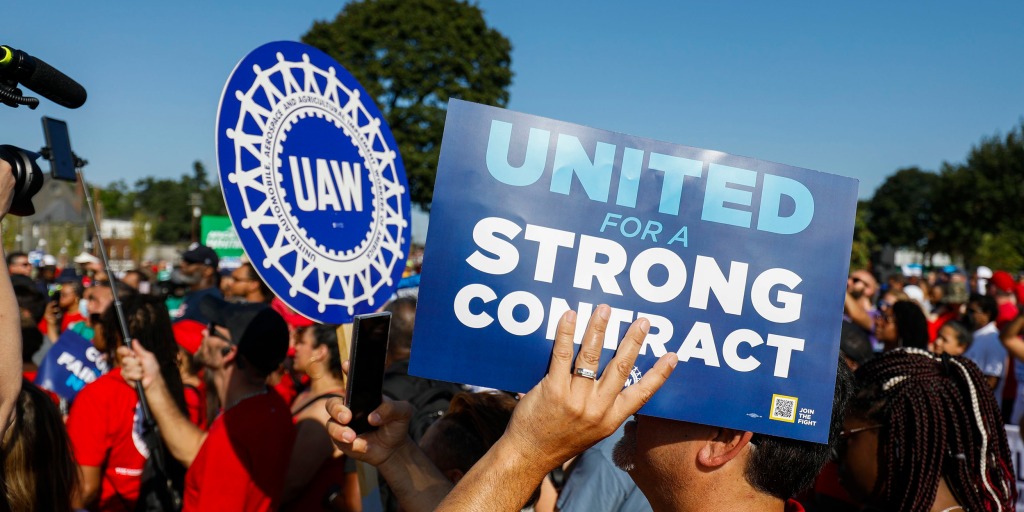The United Auto Workers union is preparing for possible strikes at the nation’s three unionized automakers next month, as they seek to regain lost concessions and protect members during the transition to electric vehicles.
United Auto Workers members have overwhelmingly authorized a strike against General Motors, Ford Motor, and Stellantis during ongoing contract negotiations, with an average of 97% of members supporting the action, although the final votes are still being counted.
Discussions are intensifying among autoworkers, union leaders, auto company executives, and investors ahead of a potential strike by the United Auto Workers (UAW) as negotiations for four-year contracts continue, with issues of fair compensation and benefits, as well as CEO pay, at stake.
The United Auto Workers union and three Detroit automakers are facing a looming strike as contract negotiations stall, potentially impacting the U.S. economy and the companies' profits amid the shift to electric vehicles and demands for improved wages and benefits.
The United Auto Workers union representing workers at the Big 3 U.S. automakers is demanding a four-day workweek at full-time pay, a 46% wage increase, and a share of company profits, threatening to strike if an agreement is not reached by September 14.
The United Auto Workers union is set to meet with General Motors to hear the automaker's counter offer after accusing the company of dragging its feet in negotiations, with the union threatening a strike if a deal is not reached by the contract deadline.
Negotiations between UAW and automakers fail to reach a deal, with the Big Three offering inadequate wage increases and rejecting key demands, potentially leading to a strike if no agreement is reached by the contract deadline.
Approximately 146,000 U.S. auto workers are poised to go on strike if General Motors, Ford, and Stellantis fail to meet their demands for substantial pay raises and restored benefits, potentially causing significant disruptions in auto production and impacting the U.S. economy.
The United Auto Workers union is ready to go on strike at American automakers if a tentative deal is not reached by Thursday night, with the union demanding significant wage increases and the return of traditional pension plans and retiree healthcare for all members.
In ongoing contract negotiations, the United Auto Workers union is adopting a new strategy of negotiating national labor contracts with all three automakers at once, rather than selecting one company as the lead negotiator, in an effort to put pressure on the companies and achieve more favorable agreements.
The local auto workers' union at Ford's Sharonville transmission plant is preparing for a potential strike as the contract between the United Auto Workers union and the Big Three automakers expires, with picketing instructions issued and workers standing strong behind negotiators.
The United Auto Workers and Detroit's Big Three automakers are on the verge of a work stoppage that could have significant implications for the industry, the economy, and President Joe Biden's political standing, as negotiations over contracts are set to expire at midnight Thursday.
Auto workers have initiated a series of strikes after failing to reach an agreement with the three largest US manufacturers over a new contract, marking a major industrial labor action and targeting all three Detroit carmakers simultaneously.
The strike by United Auto Workers against the Big 3 carmakers has sparked concern among stock-market investors over the impact on the economy, supply chains, and corporate profits.
More than 12,000 workers at the Big Three automakers are on strike in Michigan, Ohio, and Missouri due to inadequate wages and benefits, demanding higher pay and an end to the tiered employment system.
Talks between the Detroit Three automakers and the United Auto Workers continue with workers on strike, as President Joe Biden sends a team to help resolve the strike.
The auto workers' strike continues with both sides showing no signs of compromise as the United Auto Workers demand better offers and the Big Three automakers stress the need for sustainability during the industry's transformation.
The ongoing United Auto Workers strike against the Big Three automakers could result in gains for Tesla and foreign automakers as Ford, GM, and Stellantis face challenges in transitioning to electric vehicles and potentially raising prices, according to Wedbush analysts.
The United Auto Workers union is set to escalate their strike against the Big Three automakers in an effort to combat stagnant wages and other concessions, with UAW President Shawn Fain expected to announce which plants will join the strike next.
Auto workers in the United States, led by the United Auto Workers (UAW) union, are engaged in a historic strike against the Detroit Big Three - General Motors, Ford, and Stellantis - fighting for increased wages, elimination of the tiered wage system, and guarantees for workers in electric vehicle battery plants, highlighting the issue of inequality and injustice in the industry.
Summary: The United Auto Workers' strike against the Big Three automakers continues, with Ford reaching a deal with Canadian auto workers but no breakthroughs in negotiations with the UAW, as President Joe Biden prepares to visit the picket lines amid concerns over parts and supply shortages.
Tensions rise between Detroit automakers and United Auto Workers as the union threatens to expand strikes amid stalled negotiations and accusations of delays and lack of urgency.
The United Auto Workers strike against the Detroit-Three auto makers has made significant progress, giving the union a major breakthrough.
The president of the United Auto Workers union announced progress in negotiations with Detroit's Big Three automakers and that the strike will not be expanding this week, citing a "major breakthrough" with General Motors placing their electric battery manufacturing under the national master agreement with the union.
